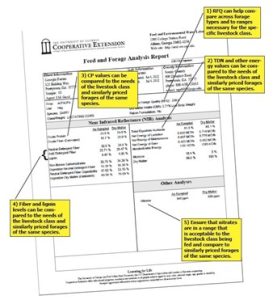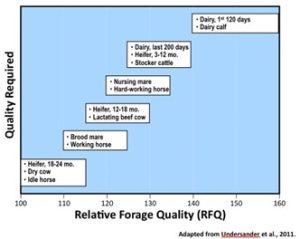
While wildlife cope with the limited food resources of winter by hibernating or migrating, those options aren’t available for domesticated livestock such as horses and cattle. These animals rely on humans to provide them with feed throughout the year.
Energy needs of livestock vary depending on their stage of production or level of work. During winter, the energy needs of livestock increase by 1 percent for every degree of temperature below 32º Fahrenheit. Unfortunately, hay and other forage products don’t come with a nutrition label, and visual assessment can’t tell you the nutrient value of a particular feed source.
So how will you know how much feed to provide to meet your animals’ energy needs? Get your hay and other forage analyzed!

A UGA lab analysis of a forage sample provides information about crude protein, total digestible nutrients, and fiber. That information is then distilled into one measure, Relative Forage Quality. RFQ helps you compare the nutrient value of different lots of forage and gives you an initial indication as to whether or not that forage will be a cost-effective base for a ration that will meet the energy needs of your animals.
Forage analysis starts with a good, representative sample of the hay or silage you plan to feed your livestock. Because weather, maturity, and fertility influence the nutrient content of forage, it’s a good idea to sample each lot, or separate cutting, even if they’re taken from the same field.
Need help collecting your forage sample or understanding your analysis report? Please call our office at 770-887-2418.